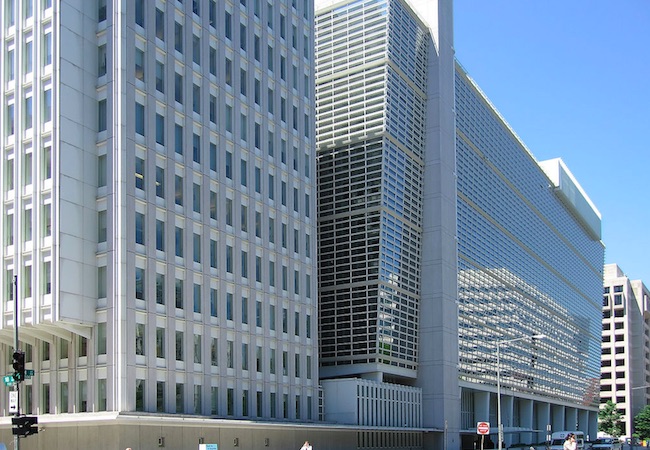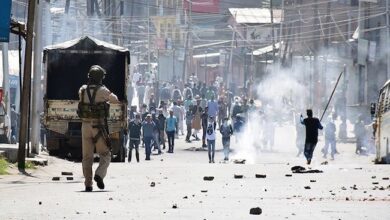
By Aly Rashid
You walk into a restaurant. However this restaurant is a little different. They only ask for your price range. Everything else, from the food you receive to the utensils to eat it, is decided by the restaurant. Regardless of allergies or ethnic obligations, everyone in the same price range will receive the same meal. That is except those whose names are written on the restaurant plaque- the food suppliers. They’ve got almost 16 times as much say as you. Replace the customers with developing countries, the meals with aid programs, the plague with the IRDB voting shares and finally the restaurant itself with the largest International Finance Institutions in the world. This restaurant belongs to the franchise of “Bretton Woods Organisations” and its branches are the World Bank (WB) and the International Monetary Fund.
Serving as the United Nations sanctioned International Finance and Loaning Institutions, the WB and IMF operate on ambitious goals of eradication of global poverty. Many Less Developed Countries (LDCs) will find themselves approaching both the Bretton Wood Institutions with hope of developmental aid and loans. Pakistan too has had close knit relations with these bodies. The WB helped mediate the Indus Water Treaty between Pakistan and India. The IMF has contributed to several projects including the Silk Road Project and current National Immunization Project. Yet two aspects of the ‘benevolence’ of these organisations cannot be ignored, especially for a country like Pakistan. These are their lending mechanisms via Structural Adjustment and their relation with the Financial Action Task Force (FATF).
The most commonly used lending mechanisms of the WB are Structural Adjustment Programs (SAPs). SAPs do much more than provide money, they aim to allow these IFIs to set terms for a state’s fiscal and economic policy. Inflation, devaluation of currency and restructuring towards a free market economy are common prerequisites to the implementation of a SAP. SAPs are made generally rather than in terms of the needs of a particular country often being criticised for a “one size fits all” approach. To aggravate this further, the hist state and other LDCs often have a minimal way in the way SAPs are designed on the WB due to the IRDB Voting Share system. For example, compared to Pakistan’s 0.51 voting share, the United States of America has a 16.67 voting share. Therefore, you’re fiscal policy could very well be dictated by Foriegn states if you do require a loan. Not surprsingly, the IMF has motivated legislation in Pakistan to the effect of implementation of their guidelines. A stark example of this is the March 2021 State Bank of Pakistan Bill which would give the SBP unprecedented amounts of autonomy in order to achieve implementation of IMF guidelines. In effect, this Bill would allow the IMF to alter exchange rates and monetary policy through the SBP without the need to consult the Parliment first. Naturally, the bill recieved strong opposition with PMLN leader Muhammad Zubair calling it something the IMF/WB has been trying to do for “quite some time” with the measures being “dangerous”.
Secondly, the IMFs close knit relation with the FATF creates a seemingly omnipresent friction between the body and Pakistan. The IMF and FATF collaborate strongly on Anti Money Laundering (AML) and Counter Finance Terrorism (CFT) goals. When Pakistan approached the IMF for a bailout in 2019 by asking for funds from the IMFs Extended Funding Facility, it not only had to accept stringent IMF rulings but also the stipulation to comply with FATF efforts. Indeed in 2019 a staff reporter of the IMF stated, “A potential blacklisting by FATF could result in a freeze of capital flows and lower investment to Pakistan. ” While the FATF had recognized Pakistan’s efforts enough to keep it off the blacklist, it continues to keep Pakistan in the grey list as of 25th June, 2021. Citing largely the need for increased CFT efforts, the FATF has kept Pakistan in the grey despite completion of 26 out of 27 objectives. Indian influence over the Asian Pacific Group (APG), the FATF’s regional watchdog, continues to make the departure from the gray list and hence the strengthening of Pakistan’s and the FATF’s relations a tall order.
It is thus necessary to approach these International Finance Institutions with caution. While development loans are a necessity for any growing economy, the increasingly stringent terms and conditions of these deals should make a country like Pakistan think twice.Fiscal sovereignty is as important as military sovereignty and to see a country being ever so willing to sacrifice it should raise several red flags. Indeed, complying with the Bretton Wood policies has become another line of contention between the Opposition and Government. With the finance ministry being shuffled mere weeks before the presentation of the June budget, former Senate Chairman Mian Raza Rabanni (PPP) went as far as to say the budget being put on the floor is “a ready-made budget by the IMF”. With the history of the IMFs working procedure, the possibility of this cannot be ignored. So how long will the teacher-student relation between Pakistan and these IFIs last? The international community has brought developments which make us question how long the prevalence of the Bretton Woods Organisations last. Will the policy of states like Turkey, who refused to go back to the IMF despite economic downfalls in the pandemic but rather resorted to measured like expanding the Lira-Riyal swap line with Qatar be more successful? Will the Asian Infrastructure Investment Bank, essentially the Chinese counterpart to the US dominated WB, begin to take precedence in the global community? These questions only time will answer. But until an alternative is found Pakistan must ask itself the question. Are we out of the woods yet?
Aly Rashid is a budding writer from Aitchison College, Pakistan where he serves as Model UN President. With a deep interest in both foreign policy and literature, he uses writing as a tool to convey messages important to him.




